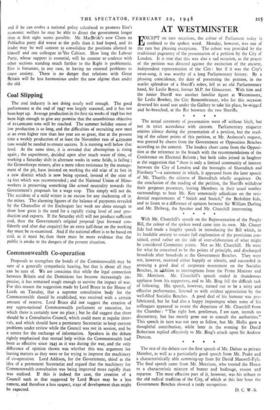AT WESTMINSTER E XCEPT on rare occasions, the colour of Parliament
today is confined to the spoken word. Monday, however, was one of the rare but pleasing exceptions. The colour was provided by the traditional pageantry of the presentation of a petition by the City of London. It is true that this was also a sad occasion, as the prayer of the petition was directed against the extinction of the ancient, independent representation of the City : but if it was the City's swan-song, it was worthy of a long Parliamentary history. By a pleasing coincidence, the duty of presenting the petition, in the scarlet splendour of a Sheriff's robes, fell to an old Parliamentary hand, Sir Leslie Boyce, former M.P. for Gloucester. With him and the junior Sheriff was another familiar figure at Westminster, Sir Leslie Bowker, the City Remembrancer, who for this occasion deserted his usual seat under the Gallery to take his place, be-wigged and be-breeched, at the Bar between the two Sheriffs.
* * The actual ceremony of presentation went off without hitch, but not in strict accordance with custom. Parliamentary etiquette enjoins silence during the presentation of a petition, but the read- ing of the salient points of this petition, at Mr. Assheton's request, was greeted by cheers from the Government or Opposition Benches according to the content. The loudest cheer came from the Opposi- tion at the reference to the breach with the recommendations of the Conference on Electoral Reform ; but both sides joined in laughter at the suggestion that " there is only a limited community of interest between the City of London and the boroughs of Shoreditch and Finsbury "—a statement in which, it appeared from the later speech of Mr. Thurtle, the citizens of Shoreditch wholly acquiesce. On the conclusion of the reading of the petition, the Sheriffs withdrew their gorgeous presences, leaving Members in their usual sombre surroundings to hear Mr. Key sonorously adjudicate on the resi- dential requirements of " Snitch and Snatch," the Berkshire kids, and to listen to a difference of opinion between Sir William Darling and Mr. Driberg, the Speaker and Mr. Churchill intervening.
* *
With Mr. Churchill's speech on the Representation of the People Bill, the colour of the spoken word came into its own. Mr. Chuter Ede had made a lengthy speech in introducing the Bill which, in its laudable anxiety to render full explanation of the provisions con- tained, erred rather on the side of over-elaboration of what might be considered Committee points. Not so Mr. Churchill. He went for what he conceived to be the points of principle, and discharged broadside after broadside at the Government Benches. They were not, however, received either happily or silently, and succeeded in arousing a good deal of corporate resentment on the Socialist Benches, in addition to interruptions from the Prime Minister and Mr. Morrison. Mr. Churchill's speech ended in thunderous applause from his supporters, and to Mr. Bing fell the difficult task of following. His speech, however, turned out to be a witty and effective performance, listened to with evident appreciation by the well-filled Socialist Benches. A good deal of his humour was pre- fabricated, but he had also a happy impromptu when some of his colleagues appeared to resent the departure of Mr. Churchill from the Chamber : "The right hon. gentleman, I am sure, intends no discourtesy, but has merely gone out to consult the authorities." This speech in turn was not easy to follow, but Mr. Hollis gave a thoughtful contribution, while later in the evening Sir David Robertson replied effectively to Mr. Bing's attack upon Sir Andrew Duncan.
The rest of the debate saw the first speech of Mr. Dalton as private Member, as well as a particularly good speech from Mr. Peake and a characteristically able summing-up from Sir David Maxwell-Fyfe. The final speech came from Mr. Morrison, who treated the House to a characteristic mixture of banter and badinage, reason and repartee. The most effective part of it, however, was his tribute to the old radical tradition of the City, of which at this late hour the Government Benches showed a tardy recognition.
D. C. W.-S.






























 Previous page
Previous page